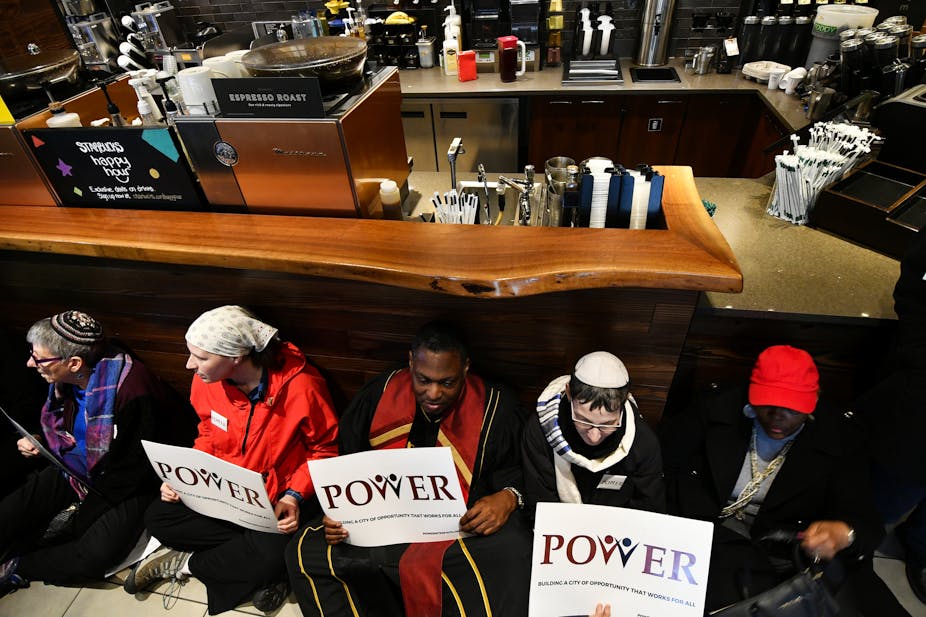I’ve found myself tweeting my moral outrage a lot recently. From #DrivingWhilstBlack to #WalkingWhilstBlack, #LivingWhilstBlack and #EatingWhilstBlack, there have been endless occasions when African Americans are punished for merely being in public spaces.
The latest took place at a Starbucks coffee shop in Philadelphia. Two African American men were arrested for apparently sitting and waiting for a friend to arrive. It follows a long list of events, including police shootings and high-level harassment of unarmed African American people while on foot, in their cars, at pool parties or even while playing with toys. And it is part of a worrying trend of criminalising the “black body”.
In response to the incident, Starbucks has announced that it will run “unconscious bias training” for all of its US employees. Perhaps in the specific setting of Starbucks, where their staff turnover is lower than most by far, this might make a small difference to the race-awareness culture of its employees. Maybe.
But we cannot escape the fact that it is much wider societal prejudice at play here. This isn’t something that Starbucks alone can fix. When society at large, aided and abetted by the state, is festering an atmosphere of extreme and in many cases lethal suspicion of black people, just how effective can a piece of work-based anti-bias training actually be?
Of course, some will opine that it is a much needed start. For me, a better start would be for legislation to change where it would become an offence to call out the police to arrest people on the grounds of what turns out to be totally unfounded suspicions. Merely being in a public space should not be routinely assigned to guilt.
Read more: What's unconscious bias training, and does it work?
Perhaps if people knew that there could be real legal consequences to their surveillance tendencies (that are based on unfounded suspicion and shaped by personal prejudice), they might think twice before engaging law enforcement to deprive innocent people of their liberty (no matter how temporary). Businesses could set an example on this front by making it a sackable offence for employees to act in this manner.
Jim Crow at work
The consequences of inaction, however, could cause a catastrophic return to the Jim Crow era of racial segregation. If African Americans continue to feel uncomfortable – or endangered – in certain spaces they are going to find spaces where they are welcomed or feel safe.
This idea has already been suggested by the #ReplaceStarbucks trend where African American patrons are encouraged to give their business to black-owned coffee shops instead of Starbucks. Of course, supporting locally-owned black businesses is not a negative thing.
But fostering segregation even more than it already persists in the US is problematic, to say the least.
Especially when US law enforcement seems to enable an informal, covert Jim Crow to continue. Institutional discrimination and inequality between black and white America can be seen in housing, health, education and the provision of utilities. And there appears to be no consistent legal address for state committed racial injustice.
UK parallels
Writing as I am from the UK, some may look to the US with smug satisfaction that this could never happen in Britain. But British people should not forget the shame of the Windrush scandal that is sweeping Britain at the moment and bears eerie similarities when it comes to the way certain segments of society suffer from surveillance and a heightened level of scrutiny.
Let us remember that this episode of national injustice was in effect designed by the immigration policy of the “hostile environment”. Former Commonwealth citizens who were invited to the UK to help rebuild its economy after World War II had their legal protections removed by the 2014 Immigration Act.
The act also turned civic officers (including healthcare professionals, teachers, landlords and employers) into border control officers. With the act requiring these workers to report any suspected immigration irregularities to the Home Office, the government’s policies have even been compared to Nazi Germany.
So the civilian paranoia of what people of colour are doing is mirrored here in the UK. There is a disproportionate surveillance and reporting of the black body, where both African American and Afro-Caribbean diaspora communities are marginalised and treated as outcasts in their own countries.
Both the Starbucks and the Windrush situations point to deeper issues of inequality, at a time when all people are supposed to have the same human rights. And it raises questions about how people of colour seem to have a lower status of citizenship than everyone else and what we can do to change this.

